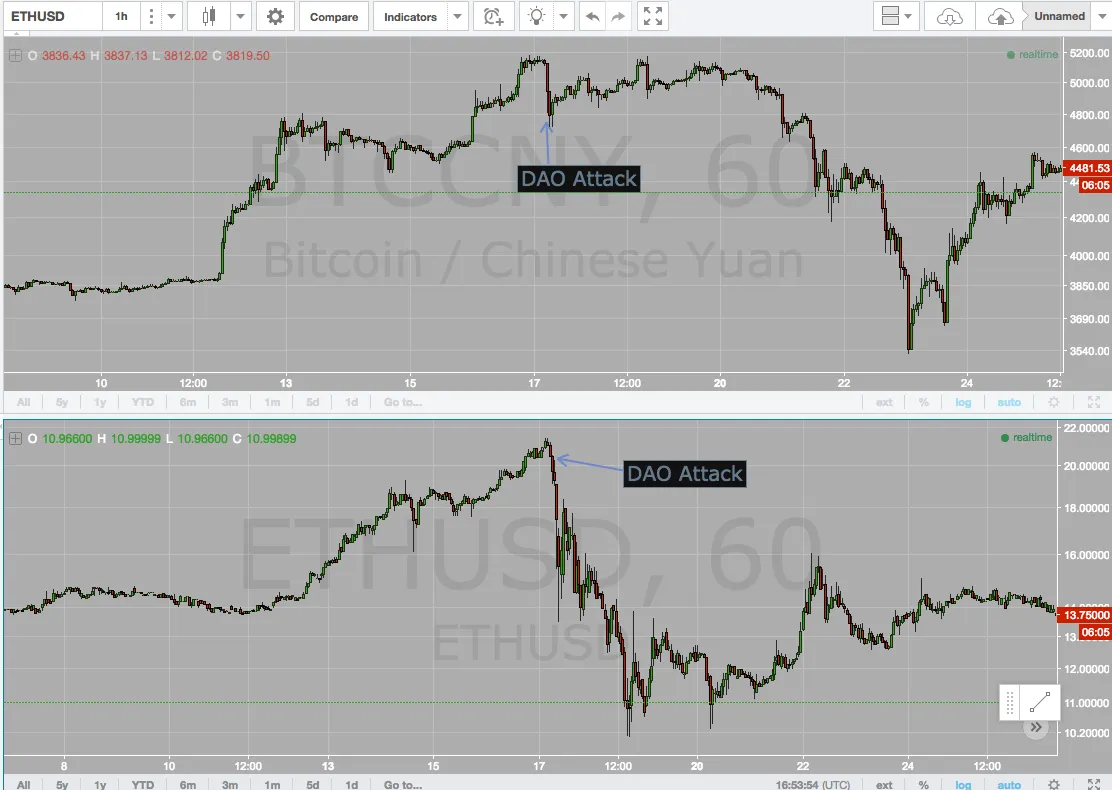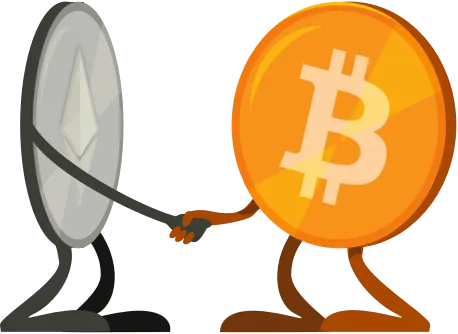
"Enemy Situtation" is a major component in all military planning. It requires getting into the mind of the enemy and playing out their moves based on objective facts available. While this topic has been talked to death and momentum has already seemed to take hold towards a hard fork, I hope to make a few additional observations that I haven't seen explained extensively and hopefully add to the discussion for theDAO attack and similar situations in the future.
Attacker Intent
Given that the attacker did not seek to negotiate, or even engage in verifiable communication with the Ethereum community or developers, it is safe to assume that their actions were malicious in nature. The chaos that resulted in the attacks obviously led to enormous losses in the value of Ethereum, but also in many other crypto markets, including Bitcoin. A few large shorts placed in advance would have generated tremendous gains.

Comparison of market behaviors in BTC and ETH during the attack
On the bright side, this malice makes deciding on a response much less complex. As of this writing, there is no ambiguity or grey areas as to the intent of the attacker, therefore (it appears) the Ethereum community and ecosystem are acting rationally by disregarding the attacker in the options being constructed.
Had the attacker offered terms of a negotiation, such as an 'industry standard' percentage/payment in ETH for red-teaming the contract, it would have been a much more complicated discussion. Since this isn't the case, motive and intent are far more clear.
Legitimacy
One of the most common 'anti-fork arguments' is more of a deflection. 'Since the code is law, the contract was just being executed and whatever happens should stand.' While on the surface, I agree with this sentiment, it is based on a false premise that can be objectively dismantled quickly.
For the splitDAO() function to be properly executed, the contract must 'burn' DAO tokens in order to receive any amount of ETH in exchange based on the split ratio. This specification not only acts as the basis of value for the DAO tokens, but it also acts as the accounting ledger within the contract.
If you don't burn the tokens, you don't get the ETH. This did not happen with the DAO attacker.
Since the attacker DID NOT burn the required ~364m DAO tokens in order for their contract to receive the ETH that it did, any arguments of the code behaving as expected/intended/required falls flat on its face. From a business law perspective, a contract with a gigantic material element failing to be observed and executed would simply be unenforceable and no sane judge or jury would disagree.
Simple Rebuttal: A MATERIAL ELEMENT of the contract (burning tokens to split) was intentionally ignored by a member of theDAO general partnership at the expense of the other members.
Immutability
This likelihood of a hard fork was certainly considered in advance by the attackers, at least as a contingency, which leaves two motives from my analysis: financial gain through massive shorts, and/or forced hard-fork with the desire/belief/hope that it would destroy the Ethereum ecosystem. The hard-fork, which is an expectation held by a number of people commenting on this topic, particularly those of the 'Bitcoin Maximalist' variety, will undoubtedly be tested. The market does not seem to agree with this assessment.
A hard-fork that 'erases' any connective tissues of outgoing transactions from theDAO contract address after the Creation Phase and prior to the hard-fork seems, to my novice programmer mind, to be the most elegant method of correcting the fundamental accounting error in both theDAO ledger and the Ethereum ledger.
A hard fork to change theDAO contract won't change past market fluctuations, nor should it. Attempting to correct the market is a bailout. Correcting an accounting error after the fact is something that couldn't be done in the real world prior the blockchain entered the scene.
One common argument against any fork of theDAO of 'code is the law'. I agree with this sentiment. The Ethereum ecosystem has jurisdiction over this incident and hard-forks are allowed based on the code. Coding a hard fork is just as valid of a coding argument as saying 'the code is law'.
Value Proposition
The value proposition of Bitcoin is not directly equivalent to the Ethereum value proposition. While I appreciate and agree with the reasoned arguments against a hard fork, I distrust any anti-fork arguments that do not appreciate the arguments for a fork. Based on my observations of this debate, the more vocally opposed and 'good vs. evil', the more likely that individual desires the destruction of the Ethereum ecosystem.
As many of the Ethereum developers have said, 'lets get the hard fork completed so we can get back to building things'. The sooner this happens, the sooner Bitcoin and other cryptocurrencies can benefit from increased interest in Ethereum as it was prior to this attack.
